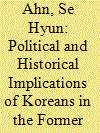| Srl | Item |
| 1 |
ID:
098378


|
|
|
|
|
| Publication |
2010.
|
| Summary/Abstract |
Over half a million ethnic Koreans found themselves in the post-Soviet states after the collapse of the Soviet Union in 1991. Caught up in the political and economic transformation of these countries, they faced the necessity of constructing their own strategies for survival and resettlement. Briefly explaining the formation of Russian Koreans' primary diasporas in their historical context and focusing on the diasporians' mobility in the post-Soviet era, this study will show how the destruction of the constraints of the authoritarian period together with the collapse of the regime itself affects diasporas and enlarges the spaces available to them. Addressing the issue of the diaporians' relationship to place and space, this article attempts to contribute to the conceptualization of the construction of new diasporic spaces and the discussion of mobility decision making, suggesting that diasporians, who had been long deprived by various constraints of the right to choose their place of residence, have comparatively high mobility and construct newer, much more sophisticated and far-flung diasporic layers.
|
|
|
|
|
|
|
|
|
|
|
|
|
|
|
|
| 2 |
ID:
182486


|
|
|
|
|
| Summary/Abstract |
This account of Koreans in the former Soviet Union describes important discoveries concerning a key hidden story of the Korean people and identity. The paper describes important aspects of Korean life in Central Asia that have been relatively undermined by many scholars in international relations and anthropology. This paper presents a detailed analysis of the history and meaning of the settlement of Korean people in Russia and Central Asia from a multitude of perspectives. Despite the size of the Korean population and its significant contributions to the building of Soviet society, very little has been written about Koreans in the former Soviet Union. In fact, the ethnic Korean group has been one of the largest minority groups in the former Soviet Union, representing an important element of both Soviet and post-Soviet political, social, ethnic, and economic history. This study revealed, once again, the tragic story of Stalin’s deportation of Kan people in Russia and explored an intriguing analysis of the re-encounter of Korean and Turkish people after a millennium and their long, intimate cultural bond. In particular, this study demonstrated that the historical and cultural affinities between Koreans and Central Asians existed long before Stalin’s deportation. Political, economic, social, and linguistic exchanges between Korean people and Turkic people are deeply rooted in the same mythology of Dangun, the legendary founder of the first Korean kingdom of Gojoseon. This reflects the dynamics of success of the Korean people in the former Soviet Union as well as their mutual interest in enhancing relations between Korea and the Turkic states and Siberian region.
|
|
|
|
|
|
|
|
|
|
|
|
|
|
|
|